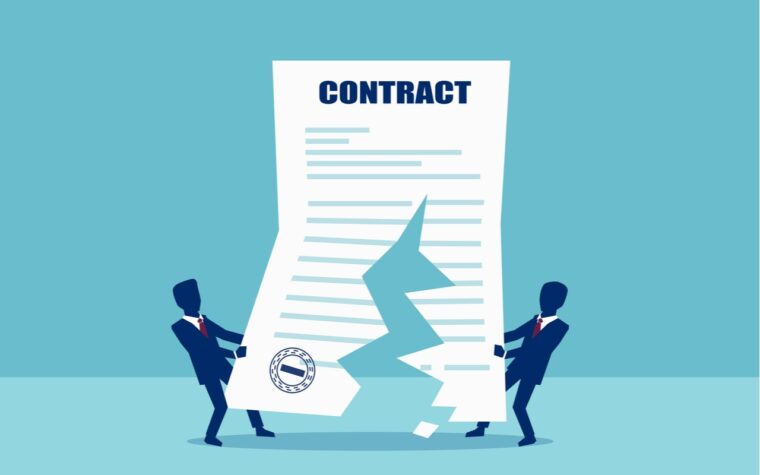Restrictive covenants are not immune to breach. When someone violates these contractual responsibilities, it sets off a chain of legal and practical consequences that can have serious consequences for all parties concerned. The implications of breaking restrictive covenants can be far-reaching, ranging from legal challenges and financial ramifications to significant property devaluation.
This article will look at the various facets of what happens when restrictive covenants are broken. We’ll go over the steps affected parties can take, the legal remedies available, and the possible consequences of such violations. You’ll be better equipped to negotiate the complexities of restricted covenants and make informed judgments about your property if you learn more about them.
Suit for Breach of Contract

When homeowners break restrictive covenants, they may face legal ramifications and even litigation. Restrictive covenants are contractual obligations that homeowners agree to follow when buying a home in a specific community or area. Typically, these covenants specify rules and regulations governing property use, maintenance, and aesthetic requirements.
In the event of a violation, the injured party may seek legal redress by bringing a breach of contract lawsuit. The purpose of this case is to obtain restitution for any losses or damages caused by the violation. It is critical to collect evidence that proves the infringement of the restrictive covenants, such as written contracts, communications, and relevant documentation.
It is recommended to speak with a contract law specialist to maximize the possibilities of a successful conclusion. They can offer crucial advice on how to navigate the legal system and present a compelling case. It is also critical to keep note of any losses incurred as a result of the infringement, such as monetary damages or reputational injury.
Alternative conflict resolution procedures, such as negotiation or mediation, may be recommended before filing a lawsuit. These tactics seek to resolve the problem amicably rather than through formal legal actions. If all attempts at reconciliation fail, it may be essential to file a breach of contract action to assert the rights provided in the restrictive covenants and seek proper compensation for the injury caused.
Monetary Losses

When homeowners violate restrictive covenants, the repercussions can extend beyond legal actions to monetary losses. Restrictive covenants are contractual obligations that homeowners agree to abide by when purchasing a property within a specific community or neighborhood. These covenants establish guidelines and standards for property use, maintenance, and aesthetics.
In the event of a violation, the affected party can seek monetary damages as a legal remedy. Monetary damages aim to compensate the innocent party for the losses they incurred as a result of the breach. The objective is to restore the injured party to the financial position they would have been in if the breach had not occurred.
There are various types of monetary damages that can be sought in these cases. Compensatory damages, for instance, aim to reimburse the actual losses suffered, while consequential damages cover indirect or foreseeable costs resulting from the breach. For example, if a contractor fails to complete a building project on time, the property owner may seek compensation for additional expenses incurred due to the delay.
Rescission or Reformation

When restrictive covenants are violated by homeowners, legal remedies such as rescission or reformation may come into play. Restrictive covenants are contractual obligations that homeowners agree to follow when purchasing a property in a specific community or neighborhood. In certain circumstances, if the terms of the contract are not fulfilled, or there are errors or misrepresentations, the affected parties can seek these remedies.
Rescission involves canceling the contract and returning both parties to their pre-contractual positions. It is typically pursued when there is a significant deception, fraud, mistake, or undue influence in the formation of the contract. For instance, if a buyer discovers that the seller misrepresented the condition of the property, they may seek rescission to dissolve the contract and recover any payments made.
Reformation, on the other hand, aims to change or rewrite a contract to more accurately reflect the true intentions of the parties involved. This remedy is sought when there is an error or ambiguity in the original agreement. For example, if there is a typographical error in the purchase price stated in the contract, the parties may seek reformation to correct the mistake.
To effectively pursue rescission or reformation, it is crucial to gather evidence that supports the claim. This can include documentation, communications, or expert opinions that validate the need for these legal remedies. Seeking the guidance of a qualified contract law attorney is essential in understanding the appropriate course of action and navigating the complexities of the legal process.
Reputational harm

As a homeowner, violating restrictive covenants can result in reputational injury with ramifications that go beyond monetary worth. The damage to one’s reputation can be severe, resulting in a loss of trust and future commercial possibilities. When homeowners fail to follow the conditions of the covenant, it may result in unfavorable publicity and damage to community relationships.
For example, if a homeowner repeatedly violates noise restrictions or fails to meet maintenance duties stipulated in the restrictive covenants, neighbors may express their displeasure online, ruining the homeowner’s reputation in the community.
To handle the reputational damage caused by covenant violations, it is critical to document instances of the breach, contact affected parties as soon as possible, and make necessary efforts to reduce the loss. Seeking legal remedies, such as injunctive relief or monetary compensation, can also contribute to the recovery of one’s reputation. A reputation management specialist or an attorney with real estate law experience can advise on the best course of action to maintain and restore one’s image as a responsible homeowner.
Conclusion
In conclusion, violating restrictive covenants for homeowners can have serious implications. When these contractual obligations are violated, homeowners may suffer reputational harm, legal challenges, and financial losses. It is critical that homeowners understand their alternatives for dealing with covenant infractions.
Homeowners can negotiate these circumstances more efficiently if they are informed of the implications and potential remedies for covenant violations. Seeking advice from legal professionals who specialize in real estate law can be quite beneficial in fulfilling contractual obligations and keeping a positive homeowner reputation.
